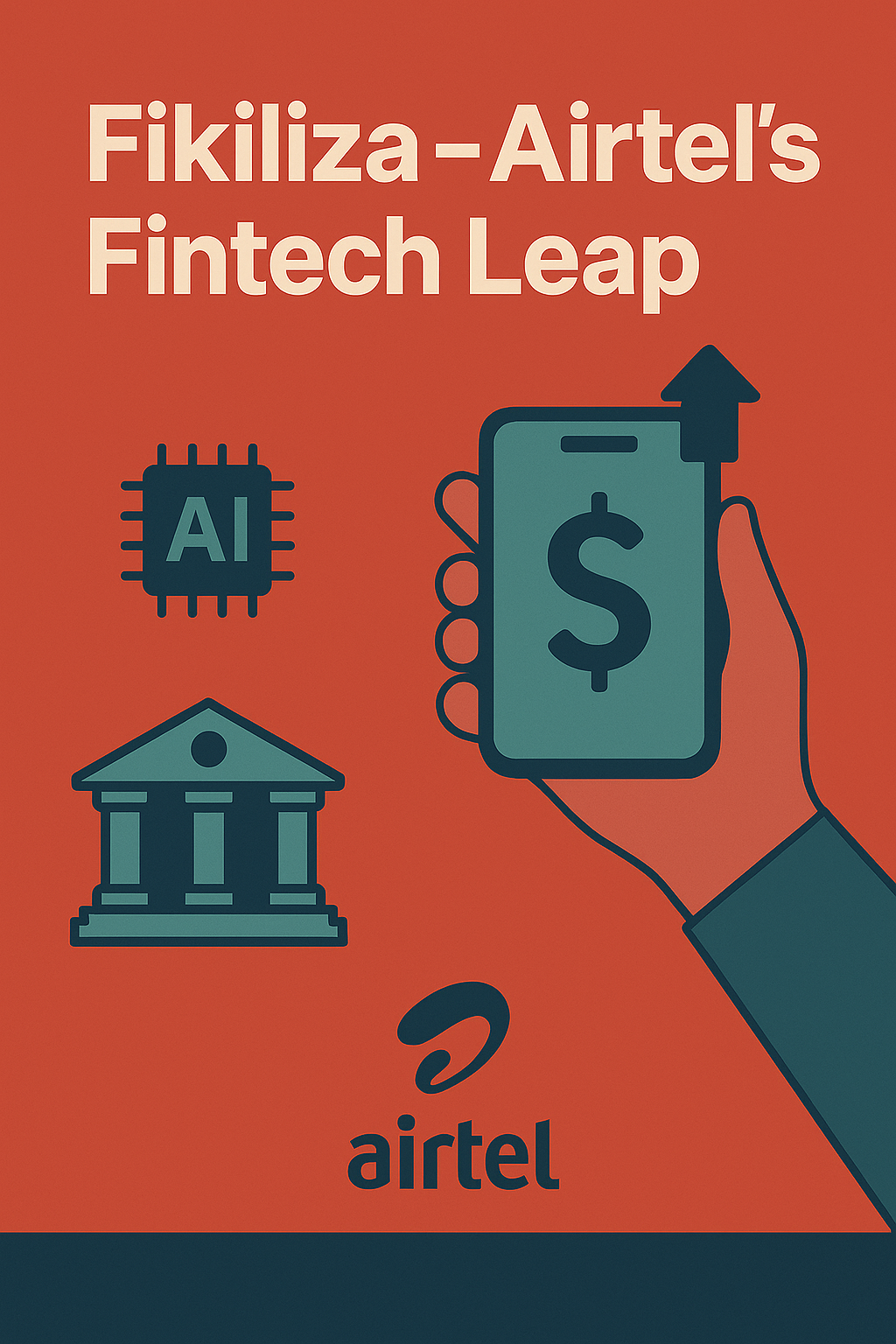How Airtel’s Fikiliza Is Redefining Financial Inclusion
The Fikiliza overdraft service, launched by Airtel Zambia in partnership with NATSAVE, marks a major shift in how telecoms are reshaping financial services in Africa. By offering micro-loans through mobile wallets, Airtel is not just a telco—it’s a fintech enabler. This model blends convenience, scale, and local banking relationships to bring credit to the unbanked and underbanked. For telcos globally, this represents a bold shift toward embedded finance.
Why This Matters for Telcos
Fintech-as-a-Service: A New Revenue Model
Mobile network operators can use their customer reach and behavioural data to offer banking-lite services. Overdrafts, buy-now-pay-later models, micro-loans—all can be embedded in mobile money apps.
Global Example: T-Mobile MONEY (USA)
T-Mobile offers a mobile-first bank account in partnership with BankMobile. Customers earn interest, avoid fees, and access early pay check deposits—all via a telco-backed app. This shows how telcos can enter banking through strategic fintech partnerships.
Regional Example: MTN MoMo Advance (Uganda)
MTN Uganda partnered with Jumo to offer MoMo Advance, a credit facility embedded into their mobile money service. It provides short-term loans to users based on mobile money activity, expanding access to capital for informal workers and small businesses.
Regional Example: Orange Bank Africa (Ivory Coast)
Orange leveraged its mobile money infrastructure to launch Orange Bank Africa, which provides savings and lending services entirely via mobile. Within two years, the platform onboarded over 500,000 customers and disbursed millions in microloans.
These examples show that telcos in emerging markets are evolving from basic service providers to full-fledged digital finance platforms, unlocking new revenue streams and deepening customer engagement.
Global Example: T-Mobile MONEY (USA)
T-Mobile offers a mobile-first bank account in partnership with BankMobile. Customers earn interest, avoid fees, and access early pay check deposits—all via a telco-backed app. This shows how telcos can enter banking through strategic fintech partnerships.
Credit Scoring Through Usage Data
Telcos sit on vast behavioural data—from top-up frequency to call patterns. By analyzing these with AI, operators can build alternative credit scoring models that allow for responsible lending even in informal economies.
AI models are typically trained using anonymized transactional and behavioural data collected through mobile usage. Features such as airtime recharge habits, mobile money transfer patterns, and voice/data consumption are used to predict creditworthiness. Machine learning algorithms—especially decision trees and ensemble models—help identify creditworthy users without relying on traditional banking history.
However, implementation challenges remain. Data quality and standardization vary across markets. Additionally, ensuring model transparency and fairness—particularly avoiding biases against underserved groups—requires rigorous validation and monitoring protocols. Telcos must also navigate data privacy regulations and secure appropriate customer consent.
Global Example: Safaricom’s M-Shwari (Kenya)
Launched with Commercial Bank of Africa, M-Shwari uses M-Pesa transaction history to determine creditworthiness. Over $6 billion in loans has been disbursed since launch, with default rates under 5%.
Telcos sit on vast behavioural data—from top-up frequency to call patterns. By analyzing these with AI, operators can build alternative credit scoring models that allow for responsible lending even in informal economies.
Global Example: Safaricom’s M-Shwari (Kenya)
Launched with Commercial Bank of Africa, M-Shwari uses M-Pesa transaction history to determine creditworthiness. Over $6 billion in loans has been disbursed since launch, with default rates under 5%.
Customer Stickiness and Ecosystem Lock-in
Offering overdrafts via mobile wallets increases platform engagement. Customers who rely on their mobile provider for daily transactions are less likely to churn.
Risk and Regulation
Credit products require compliance with lending laws, consumer protection, and data privacy rules. Telcos must build or partner for risk assessment, collections, and dispute management.
Several emerging markets have established regulatory frameworks that enable telco-led lending models. In India, the Reserve Bank of India (RBI) has issued guidelines allowing telecom operators to partner with licensed financial institutions for digital lending while mandating strict Know Your Customer (KYC) norms and grievance redress mechanisms. This has facilitated innovations like Airtel Payments Bank and Jio’s fintech ventures.
In Nigeria, the Central Bank of Nigeria (CBN) has licensed telcos such as MTN and Airtel to operate payment service banks (PSBs), allowing them to provide mobile-based savings and loan services to underserved populations. Regulatory clarity around data sharing and digital identity has been pivotal in accelerating these services.
❌ Data Privacy and Consent
AI-powered credit scoring based on mobile behaviour raises ethical and regulatory concerns.
- Risk: Lack of clarity on data consent could trigger regulatory pushback, especially as data protection frameworks tighten across Africa.
❌ Credit Risk and Default Management
Scaling mobile loans to informal sectors demands robust risk models and clear recovery mechanisms.
- Fikiliza Challenge: Without mature credit bureaus or national ID integration, Airtel and NATSAVE must rely heavily on behavioural proxies and network-level enforcement.
❌ Operational Complexity
Credit operations—risk management, dispute resolution, collections—are far more complex than prepaid airtime or mobile payments.
How Danmari Nexus Can Support Airtel and Other Telcos
At Danmari Nexus, we help telcos and fintech’s translate innovation into sustainable impact through:
- Product Performance Analytics: Understand adoption patterns, repayment behaviour, and customer segmentation.
- Credit Risk Modelling: Tailored scoring engines for emerging markets based on telco and transactional data.
- Regulatory Advisory: Ensure compliance with evolving data privacy, KYC, and lending regulations.
- Customer Impact Studies: Measure real-world improvements in financial health and access.
Final Word
Fikiliza represents more than a product launch—it’s a signal that telcos are serious contenders in Africa’s digital finance space. For Airtel Zambia, the early signs are promising. For the region’s mobile operators, the message is clear: fintech is no longer optional.


